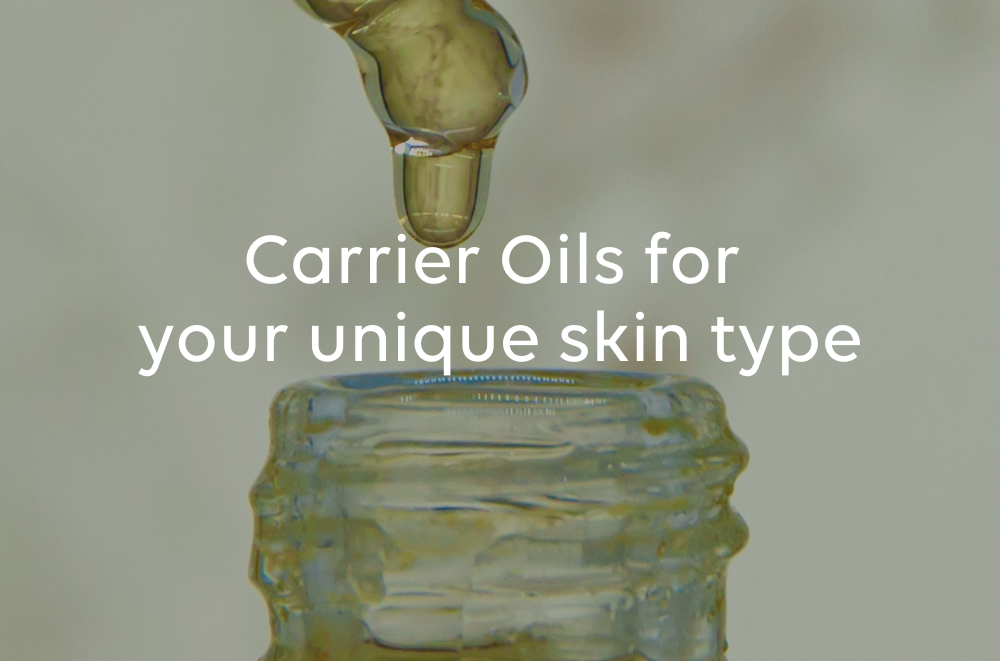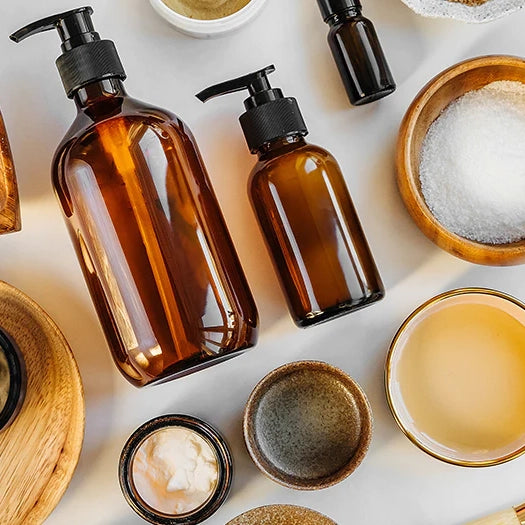
We have taken a look at some of the more common carrier oils to help you select the ones that are best suited to your unique needs.
Dry Skin
Oily Skin
Sensitive Skin
Mature Skin
Combination Skin
How you can determine your skin type
For Dry Skin
If your skin is prone to dryness and flakiness, you need an oil that provides deep hydration without clogging pores. Dry skin especially benefits from oils that are rich in fatty acids and have moisturising properties. You want an oil that is ideally packed with vitamins to help replenish moisture and restore the skin’s natural barrier.
-
Avocado Oil:
Rich in essential fatty acids and vitamins A, D and E, avocado oil nourishes the skin and enhances elasticity, offering a radiant and supple complexion. It’s also known to soothe irritation and promote skin regeneration. (also good for sensitive skin).
-
Sweet Almond Oil:
High in Vitamin E and oleic acid, sweet almond oil is an antioxidant and can help your skin retain water, to improve skin elasticity, leaving your skin looking younger and more revitalised. Almond Oil is also good for helping to reduce inflammation and as a lightweight oil that’s easily absorbed it’s great for all skin types, including sensitive skin.
-
Coconut Oil (fractionated):
This is a great moisturising oil containing lauric acid, caprylic acid and Vitamin E. It forms a protective barrier on the skin, preventing moisture loss and is especially effective at soothing dry, flaky skin. As it contains medium-chain triglycerides (MCTs) that provide fatty acids for the body it can also help ease the appearance of stretch marks.
-
Argan Oil:
Rich in antioxidants, vitamin E, and essential fatty acids, Argan Oil is deeply moisturising and nourishing. It can help to repair dry, damaged skin and can improve skin texture to promote a healthy glow. (also good for sensitive skin)
-
Jojoba Oil:
Similar in composition to the skin’s natural sebum, Jojoba oil can balance oil production, making it suitable for both dry and oily skin. It softens and hydrates the skin without clogging pores. (also good for sensitive skin)
-
Olive Oil:
Known for its hydrating properties, olive oil is a good choice for dry skin. It's rich in antioxidants, vitamins A and E as well as essential fatty acids to help maintain the skin’s moisture balance. It can also help improve skin elasticity and promote a youthful complexion.

For Oily Skin
Oily skin requires lightweight oils that won't clog pores and can help regulate oil production.
-
Jojoba Oil:
As mentioned above, as Jojoba Oil mimics the skin’s natural oils it can help regulate sebum production, making it a fantastic choice for those with oily skin. As a lightweight and non-comedogenic oil it absorbs quickly without leaving a greasy residue. It’s great for balancing the skin’s hydration and preventing excess oiliness.
-
Grapeseed Oil:
Known for its light texture and quick absorption, grapeseed oil is non-comedogenic and rich in vitamin E, making it ideal for oily and acne-prone skin. It’s also high in linoleic acid, which helps to regulate sebum production. Grapeseed oil contains antioxidants that help to reduce inflammation and promote clear skin.
-
Hemp Seed Oil:
Rich in omega-6 fatty acids, including linoleic acid, Hemp Seed oil balances oil production and helps to unclog pores. It can also help to soothe inflammation and promote a clear, radiant complexion.
-
Argan Oil:
A lightweight and non-greasy oil that absorbs quickly into the skin, Argan oil can help to regulate oil production and minimise shine. It contains antioxidants that protect the skin from environmental damage. (also good for sensitive skin)
-
Rosehip Seed Oil:
High in linoleic acid and vitamin A, Rosehip Seed oil helps to balance oil production and promote skin regeneration. It’s lightweight and non-comedogenic, making it suitable for oily and acne-prone skin. It can also help to reduce the appearance of acne scars and blemishes. (also good for sensitive skin)
-
Evening Primrose Oil:
Contains gamma-linolenic acid (GLA) which helps to regulate sebum production. Evening Primrose Oil is also helpful in soothing inflammation and promoting skin healing. It’s another lightweight oil that’s easily absorbed and is suitable for oily as well as sensitive skin types.
For Sensitive Skin
Sensitive skin needs gentle oils that soothe irritation and reduce redness without causing allergic reactions.
Some of the oils listed in the dry skin section are also really helpful for sensitive skin. They include Jojoba, Sweet Almond Oil, Argan and Avocado Oils.
Some of the other carrier oils suitable for sensitive skin include the following:
-
Calendula Oil:
This is derived from marigold flowers and is known for its anti-inflammatory and soothing properties. Calendula Oil is gentle and calming making it suitable for sensitive and irritated skin. It can help to reduce redness, inflammation and discomfit.
-
Chamomile Oil:
Renowned for its anti-inflammatory and skin-soothing properties, Chamomile Oil can help to calm sensitive and reactive skin as well as reduce redness and irritation. It’s gentle enough for use on delicate areas like the face and around the eyes.
-
Rosehip Seed Oil:
As well as being great for oily skin types, Rosehip oil can help to calm inflammation, reduce redness and promote skin regeneration. It’s rich in vitamins A, C and E, as well as essential fatty acids. It’s lightweight and easily absorbed making it a great choice for sensitive and reactive skin.
-
Virgin Coconut Oil
Deeply moisturising and with antimicrobial properties Virgin Coconut Oil may help to prevent skin infections, making it popular for sensitive skin care routines.

For Mature Skin
Mature skin benefits from oils that have anti-aging properties and can help improve skin elasticity and reduce the appearance of fine lines and wrinkles.
-
Rosehip Seed Oil
Packed with antioxidants, rosehip oil helps protect the skin from environmental damage and is known for its anti-aging benefits. It’s also rich in vitamins A, C and E and essential fatty acids, which can help to promote skin regeneration and collagen production, reducing the appearance of wrinkles and fine lines. It also improves skin tone and texture, leaving the skin smooth and radiant.
-
Argan Oil:
Contains antioxidants and essential fatty acids, including omega-6 and linoleic acid. Argan Oil nourishes and hydrates mature skin, reducing dryness and promotes elasticity. It can help to diminish the appearance of age spots and uneven skin tone.
-
Pomegranate Seed Oil:
High in antioxidants, including ellagic acid and vitamin C, Pomegranate Seed Oil supports cell regeneration and collagen production, reducing signs of ageing. It can help to improve skin elasticity and firmness, minimising the appearance of wrinkles.
-
Jojoba Oil:
Resembles the skin's natural sebum, providing deep hydration without clogging pores. It’s rich in vitamins and minerals, including vitamin E and B-complex vitamins. It can help to smooth fine lines and wrinkles, while also improving skin elasticity.
-
Evening Primrose Oil:
Contains gamma-linolenic acid (GLA), which helps to maintain the skin's moisture barrier. It soothes inflammation and irritation which can be common concerns in mature skin. Evening Primrose Oil can also help to promote a youthful complexion by improving skin texture and tone.
-
Avocado Oil:
Rich in vitamins A, D, and E, as well as omega-9 fatty acids, Avocado Oil deeply moisturises and nourishes mature skin, restoring vitality and radiance. It helps reduce the appearance of age spots and sun damage.
-
Sea Buckthorn Oil:
Loaded with antioxidants, vitamins, and essential fatty acids, Sea Buckthorn Oil can help to promote cell regeneration and collagen synthesis, reducing the signs of ageing. It can help to improve skin elasticity and firmness, restoring a youthful glow.
For Combination Skin
Combination skin can benefit from oils that balance hydration and oil production.
-
Sweet Almond Oil:
It's mild and hypoallergenic, making it safe for most skin types, including combination skin.
-
Hemp Seed Oil:
Rich in omega-6 fatty acids, including linoleic acid, Hemp Seed Oil can help to balance oil production in oily areas while providing hydration to dry patches. It’s lightweight and non-comedogenic, making it suitable for combination skin.
-
Jojoba Oil:
Resembles the skin's natural sebum, helping to regulate oil production. Jojoba Oil can also help to balance moisture levels, hydrating dry areas without clogging pores in oily areas. It’s lightweight and easily absorbed.
-
Grapeseed Oil:
High in linoleic acid, which helps to regulate sebum production, Grapeseed Oil is lightweight and non-greasy, suitable for oily combination skin. It moisturises dry areas without exacerbating oiliness in other areas.
-
Rosehip Seed Oil:
Rich in vitamins A, C, and E, as well as essential fatty acids, Rosehip Seed Oil helps to balance oil production and improve skin tone and texture. It’s lightweight and easily absorbed, making it a great choice for combination skin.
-
Argan Oil:
Lightweight and non-comedogenic, suitable for combination skin. Argan Oil can help to regulate oil production in oily areas while providing hydration to dry areas. It’s rich in antioxidants and essential fatty acids, nourishing and protecting the skin.
-
Apricot Kernel Oil:
Lightweight and easily absorbed, suitable for combination skin. Apricot Kernel Oil contains vitamins A and E, as well as oleic and linoleic acids. It provides moisture to dry areas while balancing oil production in oily skin areas.
Carrier oils can be used alone or blended together to create customised skincare solutions for whichever skin type you have. Experiment with different combinations to find the perfect match for your skin's needs. Remember to perform a patch test before using any new oil to ensure compatibility with your skin.
General Tips for Choosing Carrier Oils
-
Absorption Rate:
Consider how quickly you want the oil to absorb into your skin. Lighter oils absorb faster, while heavier oils may take longer and leave a more protective layer.
-
Comedogenic Rating:
Check the oil's likelihood of clogging pores, especially if you have acne-prone skin. Non-comedogenic oils are less likely to cause breakouts.
-
Shelf Life:
Some oils have a longer shelf life than others. Choose oils with a longer shelf life for convenience and to avoid waste.
When selecting a carrier oil, it's also important to consider any personal allergies and to perform a patch test to ensure you don't have an adverse reaction. Additionally, look for cold-pressed, pure, and unrefined oils to maximise the therapeutic benefits.

How can I determine my skin type?
Determining your skin type is a crucial step in creating an effective skincare routine tailored to your needs. Here are two common methods you can use at home to identify your skin type:
1. The Bare-Faced Method
This method involves observing the natural state of your skin following a gentle wash:
- Cleanse your face thoroughly with a mild cleanser to remove makeup, oils, and impurities.
- Pat your skin dry and do not apply any additional skincare products.
- Wait for about 30 minutes to an hour to allow your skin to return to its natural state.
- Observe your skin. Look for any shine on your forehead, nose, cheeks, and chin. Feel your skin, especially when making facial expressions, to check for tightness.
Results Interpretation:
- Dry Skin: Feels tight and may show flaky, dry areas.
- Oily Skin: Appears shiny, particularly on the forehead, nose, and chin (the T-zone).
- Combination Skin: Displays oiliness in the T-zone with normal to dry cheeks.
-
Normal Skin: Feels balanced and neither too oily nor too dry.
2. The Blotting Sheet Method
This method is quicker and can help differentiate between oily and dry areas:
- Wash your face with a gentle cleanser and pat it dry.
- Wait for about 30 minutes to let your skin return to its natural state.
- Press a clean blotting paper on different areas of your face.
- Hold the sheet up to the light to determine how much oil is visible.
Results Interpretation:
- Oily Skin: The blotting paper has spots of oil from several areas of your face.
- Dry Skin: Little to no oil is visible on the blotting paper.
- Combination Skin: Oil is visible from the forehead and nose but not from the cheeks.
- Normal Skin: Minimal oil is visible, and the skin does not feel tight or dry.
These methods provide a basic understanding of your skin type. However, factors such as climate, diet, and hormonal changes can affect your skin condition over time. For a more detailed analysis, consider consulting a dermatologist, especially if you have concerns about sensitivity, acne, or other skin conditions.





